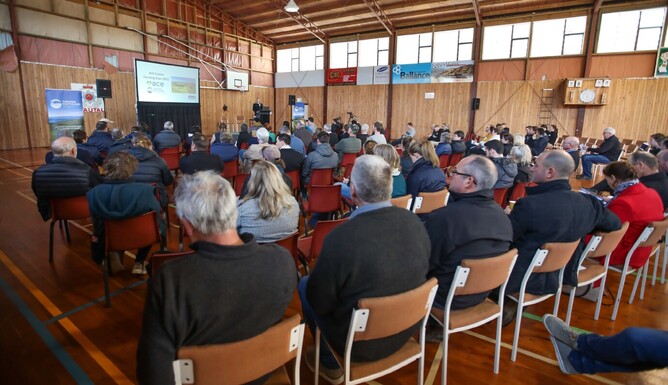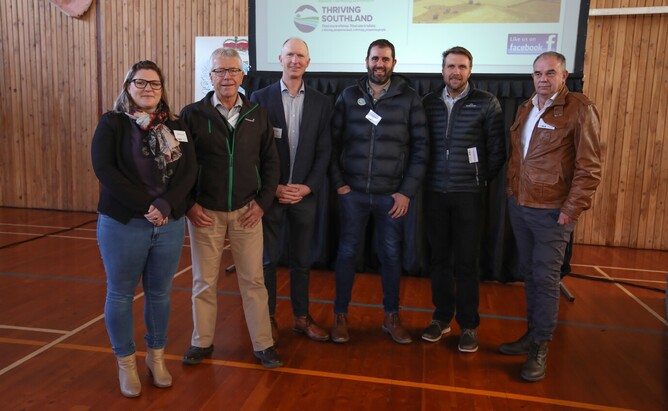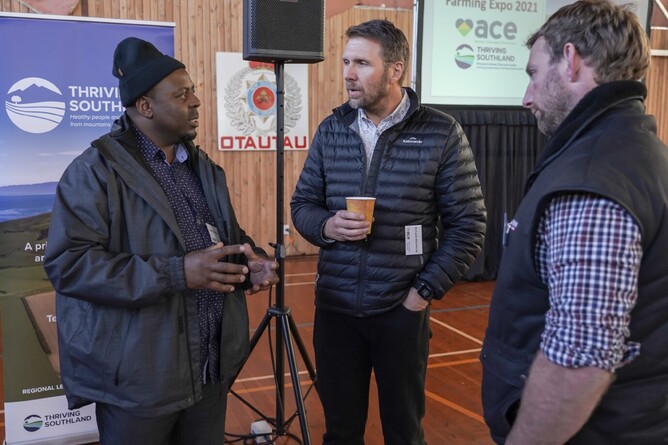More than 160 people attended the Future Farming Expo 2021 in Otautau on June 11 to hear from leading experts on how the food and fibre sectors are researching, innovating and leading the way towards a sustainable future in a rapidly changing world.
The expo was presented by the catchment groups of the Aparima Community Environment (ACE) project.
Opening the expo, Thriving Southland senior catchment coordinator Rachael Halder said ACE was a great group of farmers owning their own solutions and building a brighter future for their communities.
Keynote speaker, Thriving Southland Chairman Jeff Grant, spoke about how consumers sees farmers and what that means for the future.
There were huge levels of expectation from consumers, with Millenials and Gen Z driving this, he said.
Some of the challenges for New Zealand’s primary sector producers included competiton from alternative proteins.
In hand with this, is the rise of ready made foods and food deliveries, leading to the likes of apartments being built in Britain with microwaves only, no ovens.
The good news was that NZ farmers were well ahead of farmers overseas in taking action to ensure their food stories were great stories, he said.
Fonterra Sustainable Dairying Manager Otago/Southland Cain Duncan said the value add of trusted branding and quality seals on products was rising every year.
Fonterra was developing more digital insights that were invaluable to farmers looking at increasing efficiencies - such as how milking times compared to comparable operations, he said.
Beef + Lamb NZ leader of farm planning Ron Pellow said farmers have always planned but there was now a requirement to document their farm operations - including how they were integrating native biodiversity.
Farm plans had the potential to capture certain positive actions that could have gone un-noticed without documentation.
Another benefit of better documention was it would help if a farm was sold, or when people were taking time away.
Most farmers would be well on the way to having what’s needed - but it remained important that plans were cost effective and processes streamlined, Ron said.
Land and Water Science lead earth and environmental scientist Lisa Pearson said they were finalising the launch of their new landscapeDNA website, which displays nationwide physiographic mapping.
They have developed a new methodology to integrate water quality data with existing map layers (such as soil, geology, topography, and land cover) to map and model the processes that control the variability of water quality, she said.
AgResearch senior scientist environmental science south team Richard Muirhead posed the question of whether farmers would be able to make better decisions with sensors everywhere.
He said we’ve never seen the frequency of data before and how to interpret it becomes a big question.
Co-development with end users was essential, he said.
He encouraged farmers to “get in the stream” and look for macroinvertebrates and continue to do water sampling to build on water quality existing knowledge.
Ravensdown chief scientific officer Ants Roberts said there would not be “fantastical disruptions” in nutrients products available but they were evolving all the time - as was the science and knowledge guiding fertiliser application.
University of Otago Emeritus Professor-in-Immunology Frank Griffin said catchment groups were the best examples of collaboration in farming in NZ.
He encouraged people to consider diverse pastures, including taller grasses with deeper root systems.
“I believe we need to focus on soil and soil carbon.”
South Otago farmer and 2017 Young Farmer of the Year winner Nigel Woodhead talked about the importance of maintaining a healthy environment as being central to maintaining human health.
Farmers needed to be clear about how they wanted consumers of their produce to perceive them and what they did.
“What do you want the consumers’ minds to go to when they see your product.”
The final presentation of the day was from the British-based Agri-EPI Centre with representatives Kasi Mcreddie and Duncan Forbes outlining some new innovations in British agri-tech.
Agri-EPI’s mission is to improve in-country sustainability and support British tech exports.
ACE is a local farmer-led initiative which aims to empower farmers in the Aparima freshwater management unit to adopt good farming practices to improve the local environment.



